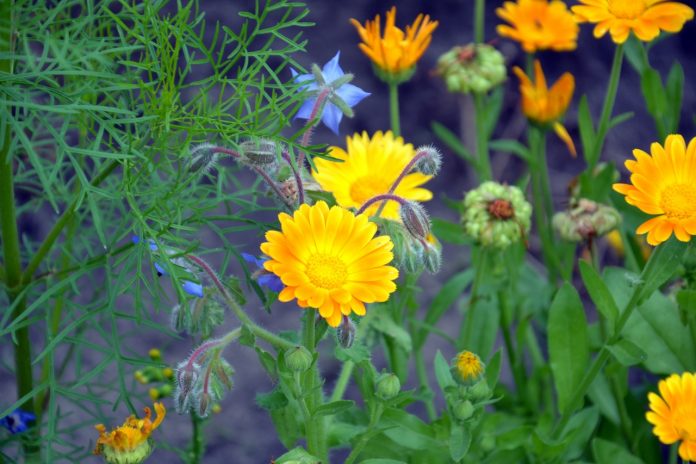If you love spending time in your garden or backyard, you know that one of your biggest challenges is dealing with pests. Some bugs like mosquitoes spread diseases such as West Nile Malaria and Zika and are in general annoying, so you probably want to eliminate them. Fortunately, you can use some plants to repel insects while beautifying your backyard. Some of the plants that you can use to repel pests include:
Lavender
Lavender has been used for the past centuries to add a sweet scent to clothes drawers and the entire home. The scent is very pleasing to human beings; however, the plant is despised by mosquitoes, flies and many other undesirable pests. Plant it near windows and doors so that the scent breezes into your home. The scent of lavender also deters fleas and moths. Plant it in sunny areas of your garden to keep it pest free.
Marigold
The various types of marigolds repel almost all insects and rabbits. The roots of the plant are particularly well known to repel nematodes; however, the abilities take a year to take effect. The plant also is known to release limonene, which slows down whiteflies that fly around tomato plants. Start by growing marigolds all over your vegetable garden.
Basil
This herb is known to repel house flies and mosquitoes. The oil in basil is also used to repel thrips. Plant this herb near tomatoes for bigger and flavorsome tomatoes. However, do not plant it near a rue plant. Basil does poorly in cold temperature; therefore, it requires a full day of sunlight. Potted basil plants need a well-drained soil; it should not be left in a bowl of water.
When watering the plant, it is always advisable to pour water at the root instead of the leaves, and this helps preserve the scent of the plant by producing a stronger fragrance. If fresh basil is inaccessible, you can always use dried basil to deter pests.
Mint
Once established in a garden, the mint plant can be tough to eradicate. Therefore, it is best when it is planted in pots to control its spread. Mint is a cost-effective herb that is used to repel unwanted pests like mosquitoes and other flies. You can put crushed mint leaves or even an empty mint container in your garden to make it pest free.
Lemongrass
Lemongrass has several uses. Apart from being used in Asian cuisines and therapeutic purposes, it can also be used as a pest repellent. It contains citronella, which is a natural oil that keeps mosquitoes at bay. Lemongrass needs full sunlight to grow well, so it grows well during the summer. This grass not only repels mosquitoes but also flies and all other unwanted bugs.
Bay leaves
Bay leaves have a stout subtle fragrance that keeps away cockroaches, moths, and flies. Just the scent is enough to make the unwanted bugs and mice disappear from your garden. Grow bay leaves in a pot and put in areas that are pet-infested.
Chrysanthemums
This plant has a special chemical called pyrethrum, which plays a significant role in keeping bugs away from your garden. Chrysanthemums that look like daisies are the best ones to use; their blooms contain enough pyrethrum which can also be used to make insect repellants. Growing this plant may help to deter spider mites, Japanese beetle, bed bugs, fleas, ticks, and roaches.
You can also pick some flowers, leave them in a cool shadowy and well-aerated place to dry, and crash them. This powder can be placed in the infested areas to kill pests.
Catnip
This plant is a member of the mint family and is a perennial herb. Cats love this plant, but apart from being a great treat for your cat, catnip is also known to repel some annoying and unwanted bugs. The essential oil found in catnip leaves, nepetalactone, is excellent and effective in keeping roaches, mosquitoes, ants, potato beetles, fleas, aphids, Japanese beetles and the cabbage looper at bay.
Planting and maintaining catnip is very easy. Plant it in partial shade to full sun as it can become invasive in cool and moist conditions. Cut it annually to control its spread.
Rosemary
Many people know rosemary as a culinary herb. However, this plant is also an effective remedy for deterring mosquitoes and other unwanted bugs. Rosemary can be used as a landscape plant near your home, in gardens as well as outdoor living areas to deter pests like lice, carrot flies, silverfish, and bean beetles. This herb is effective in both fresh and powder form.
Interplanting pest repelling plants and vegetables is the best natural way to keep pests out of your garden this spring. Other plants that repel pests include Thyme, Lemon balm, Chives, Garlic, Peppermint, Borage, castor bean, chamomile, Dill, Geraniums, Oregano, Parsley, Rue, the Venus flytrap and Tansy among many others. All these herbs fall under the edible, flowering and ornamental herbs. If you would want to learn more about pest-repelling plants, visit CSM Education today.
Your Fellow Patriot
Steven Bryant








